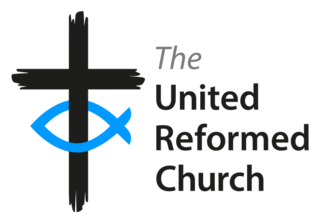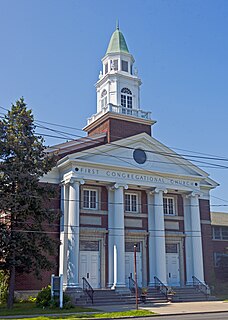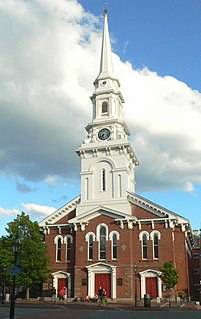Congregationalist polity, or congregational polity, often known as congregationalism, is a system of ecclesiastical polity in which every local church congregation is independent, ecclesiastically sovereign, or "autonomous". Its first articulation in writing is the Cambridge Platform of 1648 in New England.

The United Reformed Church (URC) is a Protestant Christian church in the United Kingdom. It has approximately 46,500 members in 1,383 congregations with 608 active ministers, including 13 church related community workers.

Congregational churches are Protestant churches in the Reformed tradition practicing congregationalist church governance, in which each congregation independently and autonomously runs its own affairs.
The Congregational Union of Scotland was a Protestant church in the Reformed tradition.
Henry Martyn Dexter, American Congregational clergyman and author, was born in Plympton, Massachusetts.

A united church, also called a uniting church, is a church formed from the merger or other form of union of two or more different Protestant denominations.
The Congregational Christian Churches were a Protestant Christian denomination that operated in the U.S. from 1931 through 1957. On the latter date, most of its churches joined the Evangelical and Reformed Church in a merger to become the United Church of Christ. Others created the National Association of Congregational Christian Churches or joined the Conservative Congregational Christian Conference that formed earlier in 1945. During the forementioned period, its churches were organized nationally into a General Council, with parallel state conferences, sectional associations, and missionary instrumentalities. Congregations, however, retained their local autonomy and these groups were legally separate from the congregations.
In English church history, Independents advocated local congregational control of religious and church matters, without any wider geographical hierarchy, either ecclesiastical or political. Independents reached particular prominence between 1642 and 1660, in the period of the English Civil War and of the Commonwealth and Protectorate, wherein the Parliamentary Army became the champion of Independent religious views against the Anglicanism or the Laudianism of Royalists and the Presbyterianism favoured by Parliament itself. The Independents advocated freedom of religion for non-Catholics.

The Cambridge Platform is a statement describing the system of church government in the Congregational churches of colonial New England. It was written in 1648 in response to Presbyterian criticism and in time became regarded as the religious constitution of Massachusetts. The platform explained and defended congregational polity as practiced in New England and also endorsed most of the Westminster Confession of Faith. The document was shaped most directly by the thinking of Puritan ministers Richard Mather and John Cotton.
The National Association of Congregational Christian Churches (NACCC) is an association of about 400 churches providing fellowship for and services to churches from the Congregational tradition. The Association maintains its national office in Oak Creek, Wisconsin, a suburb of Milwaukee. The body was founded in 1955 by former clergy and laypeople of the Congregational Christian Churches in response to that denomination's pending merger with the Evangelical and Reformed Church to form the United Church of Christ in 1957.
Ecclesiastical polity is the operational and governance structure of a church or of a Christian denomination. It also denotes the ministerial structure of a church and the authority relationships between churches. Polity relates closely to ecclesiology, the study of doctrine and theology relating to church organization.
Reuben Gaylord was the recognized leader of the missionary pioneers in the Nebraska Territory, and has been called the "father of Congregationalism in Nebraska." Writing in memory of Gaylord in the early 1900s, fellow Omaha pioneer George L. Miller said, "It was Reuben Gaylord, the brave Christian soldier who brought Sunday into Omaha and the Trans-Missouri country.
Karl Hugo Prüter was an Old Catholic bishop in the United States.

Bala-Bangor was a theological seminary belonging to the Welsh Independents, an association of Welsh congregationalists. It was founded in 1841 at Llanuwchllyn, then moved to a permanent location at Bala, Gwynedd in 1842 under the principalship of Michael Jones (1787–1853), who was followed by his son Michael D. Jones (1822–1898).
Congregational churches are Protestant churches in the Reformed tradition that practise congregationalist polity.
The Kansas City Statement of Faith is a 1913 confession of faith adopted by the National Council of the Congregational Churches of the United States at Kansas City, Missouri. This concise statement of Congregational beliefs restates traditional congregational polity and endorses ecumenism, while also displaying the drift away from Reformed theology that had occurred in American Congregationalism.
The National Council of Congregational Churches of the United States was a mainline Protestant, Christian denomination in the United States. It was established in Boston, Massachusetts, in 1865 and existed until 1931. In 1928, there were 5,497 Congregational churches in the U.S. with a membership of 939,130. These churches were served by 5,648 ministers.
The American Congregational Union was formed in 1853 to promote Congregationalism in the United States, primarily through the construction of Congregational churches. In 1892, its name was changed to the Congregational Church Building Society. It was an agency of the National Council of Congregational Churches.

The First Congregational Church of Albany, also known as The Ray Palmer Memorial, is located on Quail Street in the Woodlawn section of Albany, New York, United States. It is a brick building in the Colonial Revival architectural style built in the 1910s and expanded half a century later. In 2014 it was listed on the National Register of Historic Places.

Congregationalism in the United States consists of Protestant churches in the Reformed tradition that have a congregational form of church government and trace their origins mainly to Puritan settlers of colonial New England. Congregational churches in other parts of the world are often related to these in the United States due to American missionary activities.






